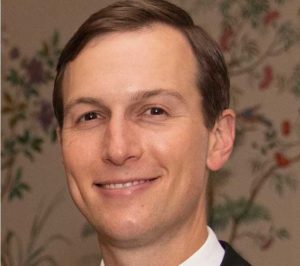Watchdogs noted that the investment came after Kushner “used his position in the White House to advance Saudi interests”—and shield the regime from accountability for the Khashoggi murder.

A private equity firm created by former White House adviser and Trump son-in-law Jared Kushner has reportedly secured a $2 billion investment from a sovereign wealth fund directed by Saudi Crown Prince Mohammed bin Salman, a deal that watchdog groups and lawmakers viewed as part of Kushner’s effort to cash in on his favorable treatment of the brutal Saudi regime.
[pullquote]”Just because the breathtaking corruption occurs in public doesn’t make it not breathtaking.”[/pullquote]
The New York Times reported Sunday that Kushner’s new firm, Affinity Partners, netted the investment six months after the end of the Trump administration “despite objections from the [Saudi] fund’s advisers about the merits of the deal,” heightening suspicions that the money is payback for Kushner’s defense of bin Salman in the wake of the gruesome 2018 murder of Jamal Khashoggi.
The United Nations and U.S. intelligence agencies have concluded that bin Salman, the de facto leader of Saudi Arabia, likely approved the Khashoggi assassination.
“As a top aide to Donald Trump, Jared Kushner spent years building ties and currying favor with Saudi Arabia,” said Noah Bookbinder, the president of Citizens for Responsibility and Ethics in Washington, in response to the Times story. “It’s no surprise that an investment fund tied to the Saudi crown prince invested billions in Kushner’s fund even though advisers raised objections.”
Journalist Judd Legum added on Twitter, “Let’s be very clear: Jared Kushner used his position in the White House to advance Saudi interests, including making sure Saudi wouldn’t be held accountable for the brutal murder of a U.S.-based journalist.”
“And now he’s cashing in,” Legum wrote.
Talk about nepotism: Six months after leaving the White House, Jared Kushner secured a $2 billion investment from a fund led by the Saudi crown prince, a close ally during the Trump admin, despite objections from the fund’s advisers about the deal. https://t.co/zA1ZjsLukn
— Citizens for Ethics (@CREWcrew) April 10, 2022
According to the Times, the objections raised by the Saudi fund’s advisory panel “included: ‘the inexperience of the Affinity Fund management’; the possibility that the kingdom would be responsible for ‘the bulk of the investment and risk’; due diligence on the fledgling firm’s operations that found them ‘unsatisfactory in all aspects’; a proposed asset management fee that ‘seems excessive’; and ‘public relations risks’ from Mr. Kushner’s prior role as a senior adviser to his father-in-law.”
But days after the panel outlined its concerns, the full board of the $620-billion fund—which the Times notes is “led” by bin Salman—dismissed them and signed off on the investment in Kushner’s firm.
The Times also revealed that Kushner was not the only official from Trump’s White House to receive Saudi money after the former president was voted out of office in 2020. Former Treasury Secretary Steve Mnuchin’s new private equity firm Liberty Strategic Capital has received $1 billion from the same Saudi fund that invested in Kushner’s outfit.
“The Saudi fund agreed to invest twice as much and on more generous terms with Mr. Kushner than it did at about the same time with former Treasury Secretary Steven Mnuchin… even though Mr. Mnuchin had a record as a successful investor before entering government.”
Despite public outcry over the regime’s continued human rights abuses, a spokesperson for Kushner’s firm told the Times that it is “proud” to have the Saudi fund as an investor. Affinity’s latest public filings with the Securities and Exchange Commission show that the firm’s primary fund has $2.5 billion under management, the bulk of which appears to be from Saudi Arabia.
The Times report, which came as Trump is gearing up for another presidential bid in 2024, drew the attention of at least one U.S. senator.
“Just because the breathtaking corruption occurs in public doesn’t make it not breathtaking,” tweeted Sen. Chris Murphy (D-Conn.), a member of the Senate Foreign Relations Committee.
Common Dream’s work is licensed under a Creative Commons Attribution-Share Alike 3.0 License. Feel free to republish and share widely.
